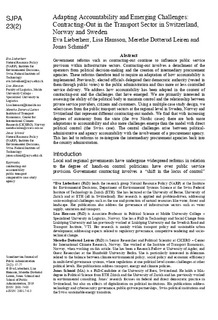Adapting Accountability and Emerging Challenges: Contracting-out in the Transport Sector in Switzerland, Norway and Sweden
Journal article, Peer reviewed
Published version

View/
Date
2019Metadata
Show full item recordCollections
- Artikler [377]
- Publikasjoner fra Cristin [393]
Original version
Scandinavian Journal of Public Administration. 2019, 23 (2), 57-77.Abstract
Government reforms such as contracting-out continue to influence public service provision within infrastructure sectors. Contracting-out involves a detachment of the operators from political decision-making and the creation of intermediary procurement agencies. These reforms therefore tend to require an adaptation of how accountability is implemented. Previously, elected officials delegated their democratic authority (vested in them through public votes) to the public administration and thus more or less controlled service delivery. We address how accountability has been adapted in the context of contracting-out and the challenges that have emerged. We are primarily interested in assessing the ability of the political body to maintain control and the relationship between private service providers, citizens and customers. Using a multiple case study design, we select cases from the public transport sectors at the regional level in Sweden, Norway and Switzerland that represent different contracting-out models. We find that with increasing degrees of autonomy from the state (the two Nordic cases) there are both more adaptations to accountability and also more challenges emerge than the model with direct political control (the Swiss case). The central challenges arise between political- administrative and agency accountability with the involvement of a procurement agency. This has led to reforms to re-integrate the intermediary procurement agencies back into the country administration.
